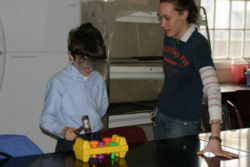Perspectives
| OER Handbook for Educators - Share OER | |
|---|---|
| Share OER | Self- or third-party publishing? | Self-publishing | Third-party publishing | Linking between versions | Publishing Student Work | Accessibility | Perspectives |
I am unconvinced in the need for repositories and referatories. As long as an OER has been produced using a suitable file format, and has a machine-readable license deed applied to it, tools such as the CreativeCommons Search utility should suffice. Individuals and organizations would be free to publish their content in any location visible to the open Web, and allow the existing infrastructure of Google, Yahoo, and the like to spider and index their resources for all to find and use. There is no need for creating walled gardens or silos of open educational content in the form of repositories or referatories (Norman, 2007).
Finally, in the context of project goals, an open educational resource project must make decisions about which of the many available funding models is most likely to result in levels of funding sufficient to allow the project to continue meeting its goals in an ongoing manner (Wiley, 2007).
Teaching and publishing should be more closely connected, to avoid a de-contextualisation of the materials and to lower the threshold for publication (Pfeffer, 2008).

In seeking a mechanism for collaborative student work for a new college course for primary educators, I quickly realized that a wiki format was ideal. With little time remaining, I initially selected the Education Wiki hosted by Wikia because of their responsiveness to my questions and my basic familiarity with the editing platform. I had a successful semester working on Wikia. I found the site administrators congenial, helpful, and generous in teaching me the basics and some other very useful skills.
Because the community on the Education Wiki was small I began searching for a larger group with greater potential for collaboration. Wikieducator administrators were even more responsive and helpful and seemed genuinely excited about what I was attempting to accomplish. I set up an initial page, but lacked time to handle the daunting task of moving all of my content pages and their associated images. However, the previously-innocuous advertising at the Wikia site became occasionally offensive to the point that I was no longer comfortable sending teachers there. The advertising was the final motivation to move, and so, with student help, I moved everything over to Wikieducator's Biology in elementary schools[2] course.
Beginning in January 2008, 36 students from my course have established user names and developed their teaching ideas to share on Wikieducator. This newer student cohort had the advantage of working with an instructor with a year of wiki experience under his belt, and the learning curve was, I hope, less steep. This latest student group reflected on their experiences with wiki educator here: Wiki reflections.
WikiEducator has proven an ideal host. It offers all of the advantages of my previous site, lacks the advertising, and has additional features like the PDF generator, and collaborative video editing. After a second semester with a larger student group, I have ironed out several kinks, and look forward to learning more in future semesters (McCabe, 2008).
Notes
- ↑ http://wikieducator.org/Opening_Our_Minds
- ↑ http://www.wikieducator.org/Biology_in_elementary_schools
Sources
Norman, D. (2007, September 8). Open Education Course: week 2 reading. D'Arcy Norman dot net. Retrieved May 13, 2008, from http://www.darcynorman.net/2007/09/08/open-education-course-week-2-reading/
McCabe, D.J. (2008, May 21). Personal Communication.
Pfeffer, T. (Last Updated 2008, March 27). OER stories: Klagenfurt OpenCourseWare. OER Wiki. Retrieved May 14, 2008, http://oerwiki.iiep-unesco.org/index.php?title=OER_stories:_Klagenfurt_OpenCourseWare
Wiley, D. (2007). On the sustainability of open educational resource initiatives in higher education. Paper commissioned by the OECD's Centre for Educational Research and Innovation (CERI) for the project on Open Educational Resources. Retrieved May 13, 2008, from http://www.oecd.org/dataoecd/33/9/38645447.pdf